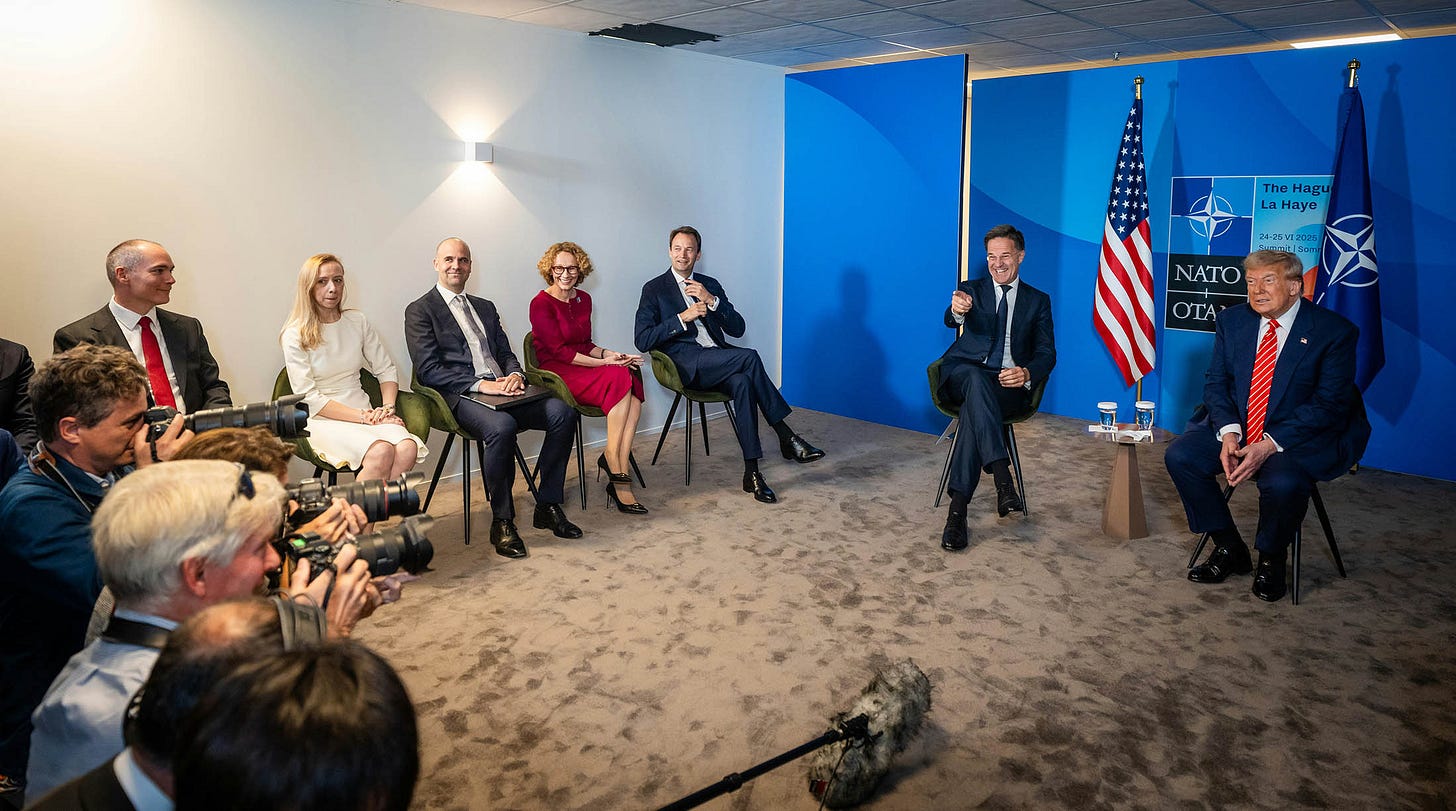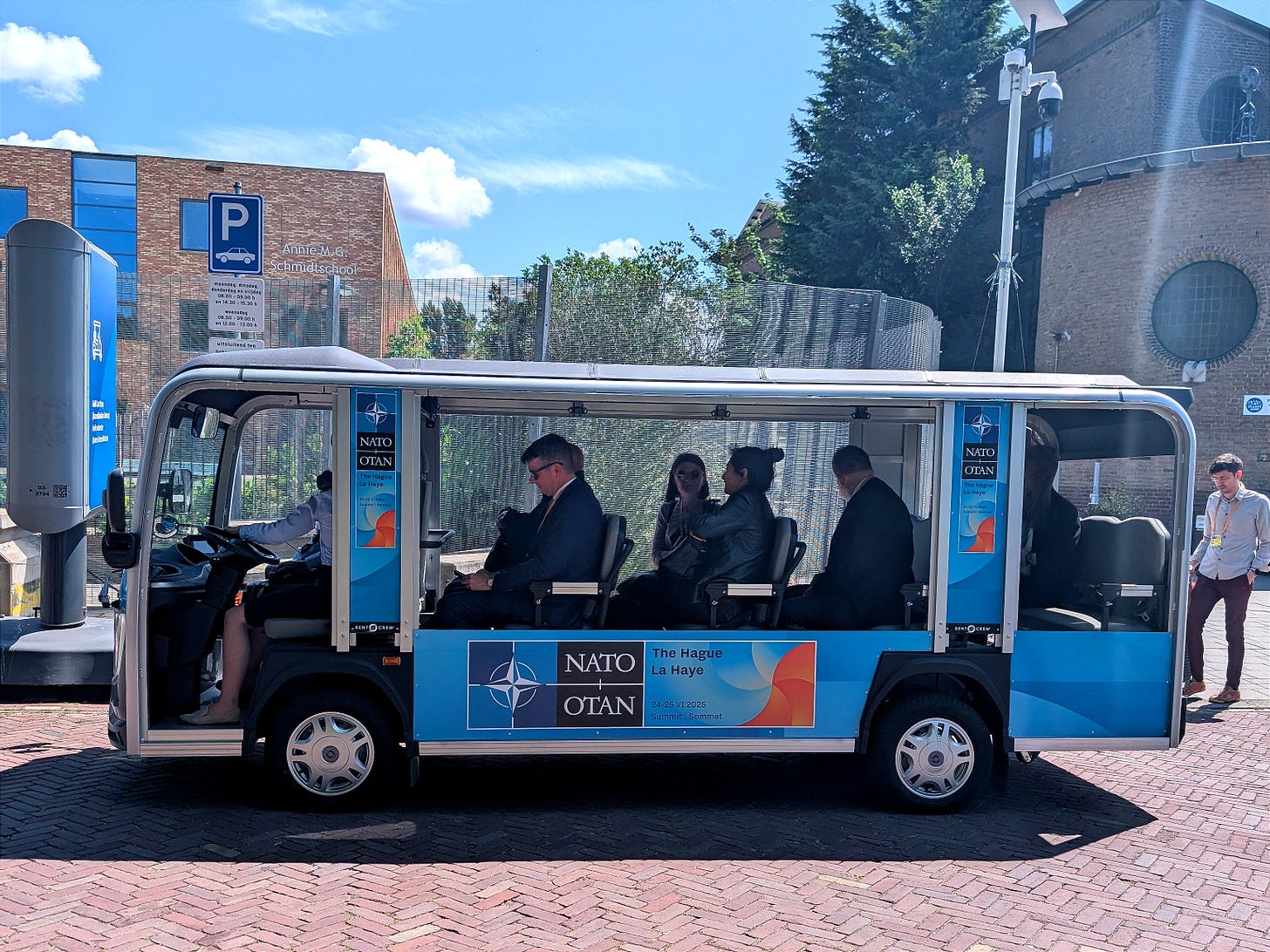What I'm Reading - the NATO 2025 edition
June 27: Five reads that piqued my interest this week
Why Russia would fight in China’s war
My top read this week is this fascinating article by Russian military expert Garrett Campbell and retired US Navy Captain, now working on NATO’s war plans, who says Russia is making preparations to fight in any war between China and the US.
The current orthodoxy, as Mark Rutte told us this week, is that if and when China has a confrontation with the US, they will call on Russia to keep the Europeans busy in Ukraine.
China’s Xi Jinping and Russia’s Vladimir Putin agreed on a ‘no-limits’ partnership before Putin invaded Ukraine in February 2022. China enables Russia’s war effort, not by sending weapons as such, but goods that can be used for domestic and military purposes.
There sometimes seems to be a smugness amongst the many Western officials who spin/brief to the media, that Russia has fallen to the role of junior partner to China in this equation, as Russia’s economy weakens from it’s war efforts.
But does this miss the bigger, and more accurate picture?
Campbell suggests so. He believes Russia is preparing itself to help China fight any war and that Putin’s grander strategy is dominance of the Arctic and Pacific.
He charts the shift in Vladimir Putin’s military doctrine that converges the Pacific and Arctic fronts rather than the European front. He says this convergence has been underway for some time but is understudied.
He is one of the few who have been paying attention, noting that within months of launching his full-scale invasion of Ukraine in 2022, Putin signed off on a new maritime doctrine prioritising the Arctic and the Pacific over the Atlantic and Europe.
He has given a key aide the job of revitalising Russian naval power in the Arctic and working with China to push forward in the region together.
It is well known that in November of 2011, the Obama administration announced the US Pivot to Asia. But fewer noted that just over a year later, in June 2013, speaking at the St. Petersburg International Economic Forum, Putin essentially did the same. He announced a Russian pivot to the Asia-Pacific region. This announcement was perhaps later eclipsed by Russia’s 2014 seizure of Crimea, initiation of conflict in Ukraine’s Donbas, and its intervention in Syria’s Civil War in 2015. And given Russia’s history in announcing foreign policy declarations whereby its aspirations have resoundingly exceeded its actual abilities, it was easy to dismiss Putin’s Pacific pivot as mere rhetoric.
But Putin’s Pacific pivot represented something different: a doubling down on a slow but steady geopolitical turn away from the Euro-Atlantic centric international order toward a Eurasian-centric one. It was not just toward the Asia Pacific, but toward the People’s Republic of China (PRC). Unlike the US pivot, it was not focused on a threat posed by an adversary but toward gaining an ally in a larger geostrategic competition to balance against and enable the defeat of perceived US hegemony. Whether the Pacific Century proves to be a myth or a reality, a 2017 statement by Putin shows how he views the world: ‘The main struggle, which is now underway, is that for global leadership, and we are not going to contest China on this.’ While one may naturally question Putin’s sincerity in making this statement with Russia’s failure to subjugate Ukraine in 2022, Putin has been forced to irreversibly commit Russia toward alignment with the PRC. As such, Putin has been unwavering in pursuing Russian strategic interests that ensure Russia is on the side it desires to prevail in the larger US-China geostrategic competition.
NATO’s brain death
As readers of Latika Takes know, I considered the NATO summit a success, pending Europe’s ultimate response.
Were Mark Rutte’s sucking up antics desirable? No. Is it Europe’s fault they are where they are — ie, reduced to bending the knee in order to save themselves from speaking Russian? 100 per cent.
To this extent, Rutte has been a breath of fresh air.
However, it is also true that there were costs to keeping Trump in the NATO tent this week in The Hague. Ukraine, for a start, was not the focus; there was no condemnation in the official communique. NATO membership is off the table, although that was the case under Joe Biden and remains a problem for many European nations, including Germany.
But while Rutte did well to keep the Americans on board for now, long-term, NATO must prepare for a future where it does not look like it does today.
And so it is incumbent upon Europe to use the time Rutte has brought them to get ready.
To that end, I found this piece by ex-State Department official Max Bergmann, on NATO’s brain death (a revival of the term used by French President Emmanuel Macron to describe it before Russia invaded Ukraine), compelling. He argues that the 5 per cent target (3.5 per cent of GDP is put towards core defence, and 1.5 per cent goes to anything really that can be loosely tied to defence) that NATO members agreed to delays addressing the real issues.
The first is the credibility gap. Living in the UK, where it has taken an enormous amount of time to get both sides to agree to just 2.5 per cent of GDP, 3.5 per cent by next decade, seems ambitious to say the least. How will this be paid for and by whom? Given Prime Minister Keir Starmer can’t even pare back welfare benefits without a major party revolt, it’s hard to see anything but higher taxes on the way.
While the community would be prepared to pay taxes for defences, I believe, the case must be made, and so far, barely anyone has discussed how this goal will be achieved, which is crucial to NATO’s credibility.
Bergmann also gets technical. He argues that instead of focusing on inputs, the Alliance needs to prepare for outputs, what it can field and how.
This is obviously the direction of the debate from here, and at NATO, there was a lot of discussion and has been for some time about how to jointly procure, mostly through the EU and agreements with non-EU countries.
Instead of asking NATO allies to spend out of ‘solidarity,’ European countries should jointly commit to being responsible for tangible tasks that contribute to a stronger, more autonomous European defence. For instance, southern countries could carry the borrowing costs for EU-issued joint debt for defence (so-called Eurobonds). By one calculation, the European Union could borrow €500 billion, resulting in an annual interest burden of about €15 billion per year.
That cost could be carried by countries on NATO’s southern flank and would give Europe a common pot of funding to undertake large-scale procurement decisions that address major capability gaps.
Additionally, what countries like Italy and Spain lack in fiscal space, they can make up for in scale. They have real manpower, approximately 160,000 and 120,000 active soldiers in uniform, for Italy and Spain, respectively, which many Eastern European countries lack. European countries could focus on leveraging this strength to defend the eastern flank, perhaps by permanently deploying a portion of these forces.
Furthermore, European countries could demand that countries that are unwilling to ramp up defence spending should play a larger role in supporting Ukraine, given the urgent need. What is needed are tangible proposals instead of abstract spending targets.
Now to the €€€

As discussed, the topic of how and where to spend the trillions that will pour into defence companies in the coming years is being had.
Options to boost defence spending include raising taxes, cutting public spending (including popular welfare and social programs), and issuing debt. The European Commission is helping with its new €150 billion loans-for-weapons scheme dubbed SAFE, and its planned smaller €1.5 billion European Defence Industry Programme. The EU's next multi-annual budget is expected to earmark more cash for defence — but that will only kick off in 2027.
‘The only European countries with public finances that allow them to aim for this [5 per cent] target are Germany, Poland, and the Baltic and Nordic countries,’ said François Heisbourg, senior adviser for Europe at the International Institute for Strategic Studies. ‘Everyone knows that France, Belgium, the UK, Spain and Italy are absolutely not in a position to keep this type of commitment.’
Moreover, the further from Russia, the harder the sell — as evidenced by Spain's eleventh-hour opposition to NATO's new target.
Another warning of potential political discontent over higher spending was a short bus ride away from the NATO summit. That's where Italy's former Prime Minister and anti-establishment leader Giuseppe Conte on Tuesday led a gathering of around 70 leftwing politicians from across Europe who signed a declaration bemoaning the continent’s rearmament.
‘Reaching 5 per cent defence spending will inevitably require deep cuts to welfare, healthcare, education, social services, and business investment,’ Conte told POLITICO
Japan abandons NATO summit, IP4 👎
It was a bit embarrassing trying to explain to European friends why Anthony Albanese skipped attending NATO for a second time (answer: no good reason).
Unfortunately, the Australian prime minister’s insular tendencies and lack of interest in national security matters were completely vindicated by the no-shows of his Korean and Japanese counterparts.
Australia’s prime minister just gives a ‘couldn’t-be-arsed’ vibe, and from my conversations with my Australian press colleagues, most seem to agree with him. Hence, his absence causes the Labor leader no trouble domestically.
Korea’s acting prime minister Lee Ju-ho was the first to say he wasn’t coming citing the domestic political turmoil and the Middle East.
But the last-minute no-show from Japan’s Ishiba Shigeru was the most disappointing, and it meant that of the Indo-Pacific 4 countries invited, only New Zealand’s Christopher Luxon showed up at the leader level.
Japan’s reasons for skipping the summit are varied, but don’t bode well for the Japan-US relationship under Trump.

Japan has been under pressure from the Trump administration to increase its defence spending, as well. According to the Financial Times, Tokyo cancelled a summit between US and Japanese defence and foreign ministers over the demand. (A Japanese official denied the report.)
Japan also did not offer its full support to the US bombings of Iran’s nuclear facilities earlier this week. The foreign minister instead said Japan “understands” the US’s determination to prevent Iran from acquiring nuclear weapons.
Japan has traditionally had fairly good relations with Iran, often acting as an indirect bridge with the West. Former Prime Minister Shinzo Abe even made a visit there in 2019.
Japan also remains heavily dependent on oil from the Middle East. It would have been adversely affected if the Strait of Hormuz had been blocked, as Iran was threatening to do.
Unlike the response from the UK and Australia, which both supported the strikes, the Ishiba government prioritised its commitment to upholding international law and the rules-based global order. In doing so, Japan seeks to deny China, Russia and North Korea any leeway to similarly erode global norms on the use of force and territorial aggression.
€1 million / minute
Dutch media have calculated the cost of hosting the summit in Rutte’s home city at €1 million per minute.
At each of the previous NATO summits in Washington, Vilnius, and Madrid, the world leaders held three such meetings. This time, Rutte opted for only one meeting due to the temperament of United States President Donald Trump, NATO sources told the newspaper.
But that does make this summit the most expensive one yet, when looking at how long the world leaders are actually meeting. It is also among the most expensive in absolute amounts. The NATO summit in Wales in 2013 cost 81.3 million euros. Madrid spent 50 million euros on the summit in 2022, and Vilnius spent 30 million euros in 2023, but that amount excluded the costs of air defence and naval ships that NATO sent to Lithuania.
The NATO summit was very well run, and I greatly enjoyed my first visit to The Hague.
I did not get to see a great deal other than to and from the World Forum, but do recommend this wine bar we found on the way home after the summit had wrapped and the filing was done (ie, that was still open after 2100!)
And I was grateful to my MP pal for a lunch invitation to the Parliament — I was intrigued to see the ‘temporary’ Parliament and hope that next time I’m back, the Medieval original has been finally restored.
And that’s my list for this edition.
📻 This week I joined Georgina Goodwin on Monocle Radio’s The Globalist to discuss the summit.
🎙️ And I agreed to a rare podcast appearance, submitting myself to questions rather than asking them, only for Eleanor Shiori Hughes.
You can watch/listen below.
Please do send me anything that’s caught your eye. I enjoy knowing what you’ve been reading.







